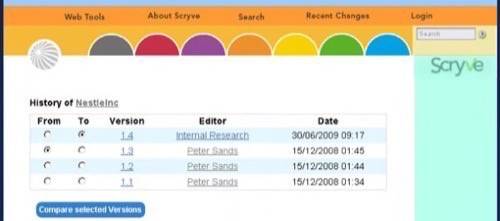If you’re the kind of person who cares about the companies with whom you do business – who owns them and what impact they have on the world – Scryve is worth checking out.

This startup was created as a research and vetting tool for determining the environmental and social responsibility of a wide range of companies. Their data comes from consumers, researchers, and KLD, a corporate social responsibility firm, as well. Scryve allows users to contribute to ratings and suggests alternative companies with better scores.
Powered by XWiki, a powerful platform for collaboration, the site allows users to engage in discussions about various companies and track changes made to a company’s profile and compare different versions.




Scryve co-founder and CEO Alexander Gillett wrote to us in an email today, “With our tools, consumers can easily make decisions with their behavior (and specific rating) of a company. As their records become more public and more important, companies are changing the decision-making process to accommodate the expectations of a better-informed public.”
Scryve has been bootstrapped by its founders through its initial research and development phases. “As we’ve moved from a beta service to a more public test of our services,” wrote Gillett, “we’ve found success in two major aspects of our services.
Scryve’s browser tool has been downloaded by more than 50,000 people to date. The browser tool, available for Firefox and Internet Explorer, allows a company’s rating, when available, to be displayed discretely in the upper right corner of the browser. Ratings will also appear in a user’s Google search results.

The icon is clickable and directs users to more details on the rating and alternative companies.
Scryve has also developed a service that makes their ratings available to any news content site and a comprehensive research guide for consumers seeking to learn more about the companies they buy from and review.
“The potential for change inherent in Scryve’s success is massive,” wrote Gillett. “With enough people using the information to make their decisions, companies pay more attention to the responsibility of their actions. Over time, it will be a given that the positive and negative actions associated with a company will impact its bottom line, and companies will have to plan accordingly.”

















